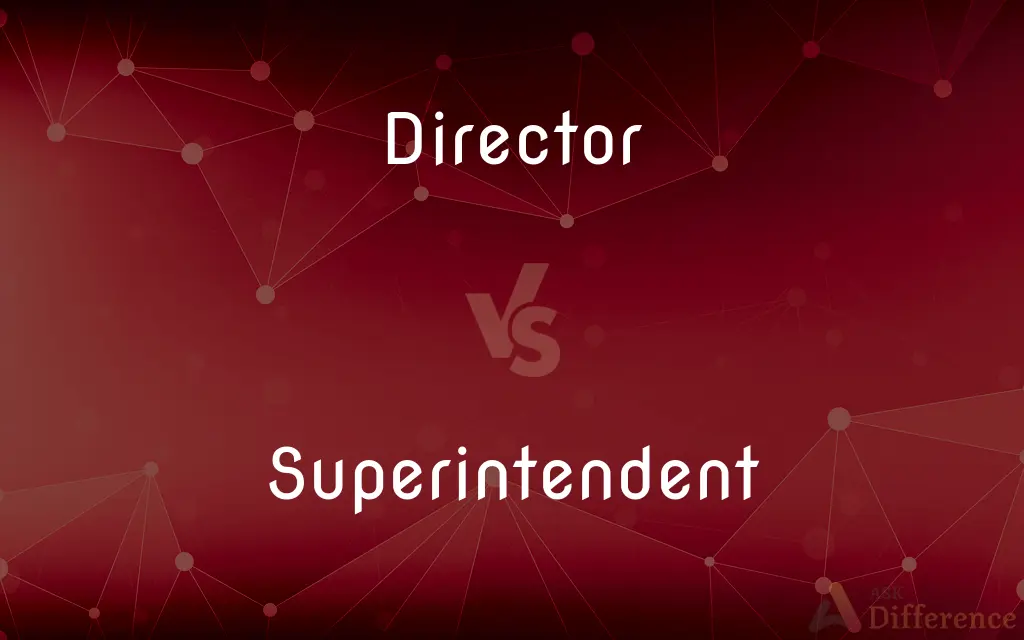Director vs. Superintendent — What's the Difference?
By Fiza Rafique & Urooj Arif — Updated on March 18, 2024
Directors often oversee specific departments within organization, focusing on strategic planning and policy implementation, whereas superintendents typically manage entire educational systems, emphasizing curriculum development and school administration.

Difference Between Director and Superintendent
Table of Contents
ADVERTISEMENT
Key Differences
Directors are pivotal in shaping the strategic direction and policies of a specific department within an organization. They focus on long-term goals, financial management, and operational efficiency. Superintendents, on the other hand, are primarily found in educational settings where they oversee the administration of school districts, implementing educational policies, and ensuring that schools meet the required educational standards.
Directors play a crucial role in the development and implementation of organizational policies, often collaborating with other department heads to ensure alignment with the overall strategic goals. Superintendents, whereas, are deeply involved in educational policy, working closely with school boards, teachers, and parents to enhance the quality of education.
In terms of scope, directors may operate within both public and private sectors, overseeing departments such as finance, human resources, or marketing. Superintendents are specifically tied to the educational sector, focusing on the broader oversight of schools, including budget management, staffing, and student performance.
Directors are responsible for guiding their departments towards achieving set objectives, which may include increasing profitability, enhancing service delivery, or improving product quality. Superintendents focus on educational outcomes, striving to improve teaching standards, student achievement, and ensuring compliance with educational laws and regulations.
While directors may engage in detailed operational planning and execution within their specific areas of responsibility, superintendents are often more involved in setting educational goals, developing curricula, and implementing policies that affect the entire school district or system.
ADVERTISEMENT
Comparison Chart
Primary Focus
Strategic planning and policy implementation in a specific department
Management of educational systems and implementation of educational policies
Sector
Both public and private sectors
Primarily educational sector
Key Responsibilities
Overseeing departmental goals, financial management, operational efficiency
Overseeing school administration, curriculum development, compliance with educational standards
Collaboration
With other department heads and organizational leadership
With school boards, teachers, parents
Outcome Orientation
Aimed at organizational objectives like profitability, service improvement
Aimed at educational outcomes like teaching standards, student achievement
Compare with Definitions
Director
A board member of an organization or company, participating in decision-making processes.
He serves as a director at several tech startups, advising on strategic growth.
Superintendent
An official in charge of the administration and management of a school district.
The superintendent announced new policies to improve district-wide literacy rates.
Director
Someone who guides and shapes the strategic direction of an organization.
As the director, she implemented innovative policies to enhance productivity.
Superintendent
Someone who interacts with various stakeholders in the education system to improve outcomes.
The superintendent hosted community forums to discuss school improvement plans.
Director
In the context of films and theater, a director is responsible for the artistic vision and execution.
The director's unique style garnered critical acclaim.
Superintendent
A person responsible for ensuring educational standards and policies are met.
As superintendent, her goal was to enhance the quality of education across schools.
Director
A person responsible for overseeing a specific department within an organization.
The director of marketing launched a new advertising campaign.
Superintendent
A leader in the educational sector, focusing on curriculum development and teacher training.
Under the new superintendent, the district introduced innovative STEM curricula.
Director
An individual in charge of managing projects or initiatives within a specific domain.
The project director ensured the initiative was completed on time and within budget.
Superintendent
An individual overseeing the operational aspects of educational institutions.
The superintendent worked tirelessly to secure funding for new school programs.
Director
One that supervises, controls, or manages.
Superintendent
Abbr. Supt. A person who has the authority to supervise or direct.
Director
A member of a group of persons chosen to control or govern the affairs of an institution or corporation.
Superintendent
A janitor or custodian in a building, especially in an apartment house.
Director
A person who supervises the creative aspects of a dramatic production or film and instructs the actors and crew.
Superintendent
A person who is authorized to supervise, direct or administer something.
Director
The conductor of an orchestra or chorus.
Superintendent
(Commonwealth) A police rank used in Commonwealth countries, ranking above chief inspector, and below chief superintendent.
Director
An electronic device that continually calculates and displays information used for firing weapons at moving targets, such as missiles or aircraft.
Superintendent
The manager of a building, usually a communal residence, who is responsible for keeping the facilities functional and often collecting rent or similar payments, either as also the building's landlord or on behalf of same. Often abbreviated "super".
Director
One who directs; the person in charge of managing a department or directorate (e.g., director of engineering), project, or production (as in a show or film, e.g., film director).
Superintendent
The head of a Sunday school.
Director
A member of a board of directors.
Superintendent
In some Protestant churches, a clergyman having the oversight of the clergy of a district.
Director
A counselor, confessor, or spiritual guide.
Superintendent
A janitor.
Director
That which directs or orientates something.
Superintendent
Overseeing; superintending.
Director
(military) A device that displays graphical information concerning the targets of a weapons system in real time.
Superintendent
Overseeing; superintending.
Director
(chemistry) The common axis of symmetry of the molecules of a liquid crystal.
Superintendent
One who has the oversight and charge of some place, institution, or organization, affairs, etc., with the power of direction; as, the superintendent of an almshouse; the superintendent of public works.
Director
One who, or that which, directs; one who regulates, guides, or orders; a manager or superintendent.
In all affairs thou sole director.
Superintendent
A person who directs and manages an organization
Director
One of a body of persons appointed to manage the affairs of a company or corporation; as, the directors of a bank, insurance company, or railroad company.
What made directors cheat in South-Sea year?
Superintendent
A caretaker for an apartment house; represents the owner as janitor and rent collector
Director
A part of a machine or instrument which directs its motion or action.
Director
A slender grooved instrument upon which a knife is made to slide when it is wished to limit the extent of motion of the latter, or prevent its injuring the parts beneath.
Director
Someone who controls resources and expenditures
Director
Member of a board of directors
Director
Someone who supervises the actors and directs the action in the production of a show
Director
The person who leads a musical group
Common Curiosities
What is the main difference between a director and a superintendent?
A director typically oversees a specific department within an organization focusing on strategic planning, while a superintendent manages entire educational systems, emphasizing curriculum development and school administration.
Who does a director typically report to?
Directors usually report to the executive leadership of the organization, such as a CEO or board of directors.
What are the key responsibilities of a superintendent?
Key responsibilities include managing school administration, implementing educational policies, curriculum development, and ensuring compliance with educational standards.
How do superintendents impact student achievement?
By focusing on educational policies, curriculum development, and teacher training, superintendents directly impact student achievement and educational quality.
Can a superintendent influence educational policy?
Superintendents often work closely with school boards and educational authorities, playing a significant role in shaping and implementing educational policies.
Can a director work in an educational setting?
Yes, a director can work in an educational setting, often overseeing specific departments like finance or human resources, rather than the entire system.
Do directors have a role in policy implementation?
Yes, directors play a crucial role in the development and implementation of organizational policies within their departments.
What challenges do directors face in their roles?
Directors may face challenges in aligning departmental goals with organizational strategy, managing resources efficiently, and adapting to market changes.
What skills are essential for a director?
Essential skills include strategic planning, leadership, financial management, and effective communication.
How does a superintendent interact with the community?
Superintendents may hold public meetings, forums, and engage with parents and community members to discuss educational strategies and improvements.
What sectors do superintendents work in?
Superintendents work primarily in the educational sector, managing school districts or entire educational systems.
Can directors influence organizational strategy?
Yes, directors often contribute to shaping the strategic direction of their organizations through policy development and implementation.
What are the biggest challenges for superintendents?
Superintendents face challenges in balancing budget constraints, improving educational quality, and meeting the diverse needs of students and teachers.
What qualifications are necessary for a superintendent?
Typically, a superintendent must have an advanced degree in education or educational administration, along with extensive experience in teaching and school administration.
How do directors and superintendents collaborate with others?
Directors collaborate with department heads and organizational leadership, while superintendents work with school boards, teachers, and parents.
Share Your Discovery

Previous Comparison
Monumentalism vs. Monumentalist
Next Comparison
Halfpace vs. StaircaseAuthor Spotlight
Written by
Fiza RafiqueFiza Rafique is a skilled content writer at AskDifference.com, where she meticulously refines and enhances written pieces. Drawing from her vast editorial expertise, Fiza ensures clarity, accuracy, and precision in every article. Passionate about language, she continually seeks to elevate the quality of content for readers worldwide.
Co-written by
Urooj ArifUrooj is a skilled content writer at Ask Difference, known for her exceptional ability to simplify complex topics into engaging and informative content. With a passion for research and a flair for clear, concise writing, she consistently delivers articles that resonate with our diverse audience.














































